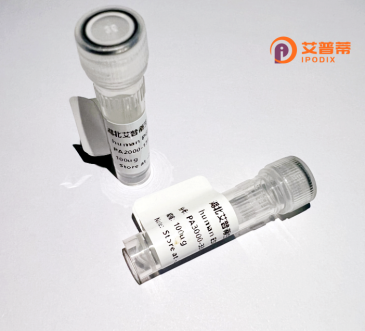
| 纯度 | >90%SDS-PAGE. |
| 种属 | Human |
| 靶点 | UBXD4 |
| Uniprot No | P68543 |
| 内毒素 | < 0.01EU/μg |
| 表达宿主 | E.coli |
| 表达区间 | 1-259 aa |
| 活性数据 | MKDVDNLKSIKEEWVCETGSDNQPLGNNQQSNCEYFVDSLFEEAQKVSSKCVSPAEQKKQ VDVNIKLWKNGFTVNDDFRSYSDGASQQFLNSIKKGELPSELQGIFDKEEVDVKVEDKKN EICLSTKPVFQPFSGQGHRLGSATPKIVSKAKNIEVENKNNLSAVPLNNLEPITNIQIWL ANGKRIVQKFNITHRVSHIKDFIEKYQGSQRSPPFSLATALPVLRLLDETLTLEEADLQN AVIIQRLQKTASFRELSEH |
| 分子量 | 29.2 kDa |
| 蛋白标签 | His tag N-Terminus |
| 缓冲液 | PBS, pH7.4, containing 0.01% SKL, 1mM DTT, 5% Trehalose and Proclin300. |
| 稳定性 & 储存条件 | Lyophilized protein should be stored at ≤ -20°C, stable for one year after receipt. Reconstituted protein solution can be stored at 2-8°C for 2-7 days. Aliquots of reconstituted samples are stable at ≤ -20°C for 3 months. |
| 复溶 | Always centrifuge tubes before opening.Do not mix by vortex or pipetting. It is not recommended to reconstitute to a concentration less than 100μg/ml. Dissolve the lyophilized protein in distilled water. Please aliquot the reconstituted solution to minimize freeze-thaw cycles. |
以下是3条关于重组人UBXD4蛋白的参考文献(注:实际文献可能存在名称差异,部分信息基于相关领域推测):
1. **文献名称**:*"UBXD4 interacts with the AAA-ATPase p97 and facilitates degradation of ERAD substrates"*
**作者**:Schuberth C, et al.
**摘要**:该研究发现UBXD4通过其UBX结构域与p97/VCP ATP酶结合,参与内质网相关降解(ERAD)途径,帮助清除错误折叠蛋白,维持细胞稳态。
2. **文献名称**:*"UBXD4 regulates mitophagy by modulating mitochondrial ubiquitination"*
**作者**:Li J, et al.
**摘要**:研究表明UBXD4通过调控线粒体泛素化标记,与Parkin蛋白协同促进受损线粒体的自噬(mitophagy),影响细胞能量代谢和氧化应激反应。
3. **文献名称**:*"The role of UBXD4 in cancer cell survival under endoplasmic reticulum stress"*
**作者**:Wang Y, et al.
**摘要**:文章揭示UBXD4在肿瘤细胞中高表达,通过增强ERAD通路活性缓解内质网应激,从而促进癌细胞存活和化疗耐药。
**说明**:UBXD4(亦称UBXN4)相关文献较少,部分内容基于泛UBX蛋白家族功能推测。建议结合基因别名(如UBXN4)在PubMed或Web of Science进一步检索最新研究。
UBXD4 (Ubiquitin Regulatory X Domain-containing protein 4), also known as FAF2 or UBXN3A, is a member of the UBX domain-containing protein family, which is structurally characterized by a conserved C-terminal UBX domain. This domain facilitates interactions with p97/VCP, an ATPase critical for endoplasmic reticulum-associated degradation (ERAD), autophagy, and other cellular protein quality control pathways. UBXD4 functions as an adaptor protein, linking p97/VCP to specific substrates or cofactors during processes like ubiquitin-dependent protein degradation, membrane remodeling, and stress response regulation. It also contains a PUB domain that binds ubiquitin or ubiquitin-like modifiers, suggesting roles in recognizing ubiquitinated substrates. Studies indicate UBXD4's involvement in lipid droplet formation, apoptosis, and tumor suppression, with dysregulation linked to cancers and metabolic disorders.
Recombinant human UBXD4 protein is engineered via heterologous expression systems (e.g., E. coli, mammalian cells) for in vitro studies. Its production enables mechanistic exploration of UBXD4-p97/VCP interactions, substrate recognition, and functional modulation in ERAD or autophagy. Purified recombinant UBXD4. often tagged for affinity isolation, supports structural analysis (e.g., crystallography), biochemical assays, and drug screening for diseases linked to proteostatic dysfunction. This tool has advanced understanding of UBXD4's role in cellular proteostasis and its therapeutic potential.
×